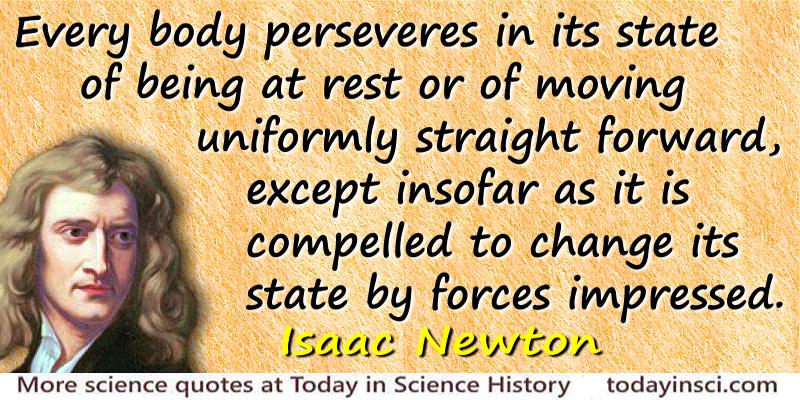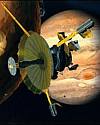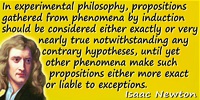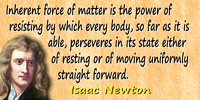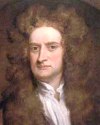 (source)
(source)
|
Sir Isaac Newton
(25 Dec 1642 - 20 Mar 1727)
English physicist and mathematician who made seminal discoveries in several areas of science, and was the leading scientist of his era.
|
Isaac Newton
“Every body perseveres in its state of being at rest”
Illustrated Quote - Large (800 x 400 px)
More Isaac Newton quotes on science >>
Newton wrote his famous three laws of motion in his magnum opus on mechanics, Philosophiæ Naturalis Principia Mathematica. Translated into English, the title is The Principia: Mathematical Principles of Natural Philosophy, familiarly known as simply the Principia. It was first published on 5 Jul 1687, and as the title suggests, it was written in Latin, the language then commonly used by scientists. As it was originally written, the first law of motion appeared in print as:
“Lex I: Corpus omne perseverare in statu suo quiescendi vel movendi uniformiter in directum, nisi quatenus illud a viribus impressis cogitur statum illum mutare.”
Newton did not publish a version in English, though various translations have been made since then. The quote as given above is as translated by I. B. Cohen and Anne Whitman (1999). It is very faithful to the original Latin, as seen by comparing with a direct version from Google Translate:
Law I: Every body perseveres in its state of rest, or of uniform motion in a right line, unless in so far as it is compelled to change that state by forces impressed thereon.
The word “perseveres” can be translated as “continues” to be more modern.
After stating his first law, Newton gives a further explanation (with 1846 translation by Andrew Motte):
“Projectilia perseverant in motibus suis nisi quatenus a resistentia aeris retardantur & vi gravitatis impelluntur deorsum. Trochus, cujus partes cohaerendo perpetuo retrahunt sese a motibus rectilineis, non cessat rotari nisi quatenus ab aere retardatur. Majora autem Planetarum & Cometarum corpora motus suos & progressivos & circulars in spatiis minus resistentibus factos conservant diutius.”
“Projectiles persevere in their motions, so far as they are not retarded by the resistance of the air, or impelled downwards by the force of gravity. A top, whose parts by their cohesion are perpetually drawn aside from rectilinear motions, does not cease its rotation, otherwise than as it is retarded by the air. The greater bodies of the planets and comets, meeting with less resistance in more free spaces, preserve then motions both progressive and circular for a much longer time.”
Every student of introductory physics will have worked problems on the motion of projectiles (such as a thrown ball or a bullet), and will remember that the motion is resolved into two perpendicular components, the vertical motion accelerated due to gravity, and the horizontal component of motion which is always treated as uniform motion at a constant speed. Usually introductory problems allow simplification with the phrase “neglecting air resistance.” Little may the student realize that their teachers have so closely echoed Newton's words for centuries!
Also interesting is Newton's insight into the fact that outer space is free of resistance. No longer was it necessary to regard the motion of planets to be due to invisible winged angels pushing them along. Now Newton explained they naturally retained their forward motion as a basic law of nature.
- Science Quotes by Sir Isaac Newton.
- 25 Dec - short biography, births, deaths and events on date of Newton's birth.
- Isaac Newton - biography from Famous Men of Science (1889)
- Isaac Newton - Comments on his “Playing on the Seashore” Quote
- Isaac Newton - “Playing on the Seashore” illustrated quote - Medium 500px.
- Isaac Newton - “Playing on the Seashore” illustrated quote - Large 800px.
- Isaac Newton - context of quote “A change in motion” - Medium image (500 x 250 px)
- Isaac Newton - context of quote “A change in motion” - Large image (800 x 400 px)
- Isaac Newton - context of quote “In experimental philosophy” - Medium image (500 x 250 px)
- Isaac Newton - context of quote “In experimental philosophy” - Large image (800 x 400 px)
- Isaac Newton - context of quote “Standing on the shoulders of giants” - Medium image (500 x 250 px)
- Isaac Newton - context of quote “Standing on the shoulders of giants” - Large image (800 x 400 px)
- Isaac Newton - context of quote “Impressed force is the action” - Medium image (500 x 250 px)
- Isaac Newton - context of quote “Impressed force is the action” - Large image (800 x 400 px)
- Isaac Newton - context of quote “Inherent force of matter is the power of resisting…” - Medium image (500 x 250 px)
- Isaac Newton - context of quote “Inherent force of matter is the power of resisting…” - Large image (800 x 400 px)
- Isaac Newton - context of quote “Plato is my friend” - Medium image (500 x 250 px)
- Isaac Newton - context of quote “Plato is my friend” - Large image (800 x 400 px)
- Isaac Newton - context of quote “Colours which appear through the Prism ” - Medium image (500 x 250 px)
- Isaac Newton - context of quote “Colours which appear through the Prism ” - Large image (800 x 400 px)
- Isaac Newton - context of quote “Nature does nothing in vain” - Medium image (500 x 250 px)
- Isaac Newton - context of quote “Nature does nothing in vain” - Large image (800 x 400 px)
- Isaac Newton - context of quote “No more causes of natural things should be admitted” - Medium image (500 x 250 px)
- Isaac Newton - context of quote “No more causes of natural things should be admitted” - Large image (800 x 400 px)
- Isaac Newton - context of quote “Truth is ever to be found in simplicity” - Medium image (500 x 250 px)
- Isaac Newton - context of quote “Truth is ever to be found in simplicity” - Large image (800 x 400 px)
- Isaac Newton - context of quote “Every body perseveres in its state of being at rest” - Medium image (500 x 250 px)
- Isaac Newton - context of quote “God, in the beginning, formed matter” - Medium image (500 x 250 px)
- Isaac Newton - context of quote “God, in the beginning, formed matter” - Large image (800 x 400 px)
- Isaac Newton - context of quote “The cause of gravity is what I do not pretend to know” - Medium image (500 x 250 px)
- Isaac Newton - context of quote “The cause of gravity is what I do not pretend to know” - Large image (800 x 400 px)
- Sir Isaac Newton’s Apple-Tree - debunking the myth, from Historic Ninepins: A Book of Curiosities by John Timbs (1869)
- Newton and the Dog - debunking the myth about Newton’s dog Diamond.
- Booklist for Isaac Newton.
